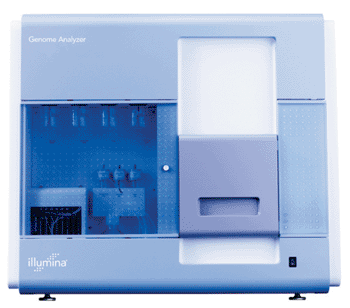Cervical Cancer Genomic Study Completed
By LabMedica International staff writers
Posted on 14 Jan 2014
A comprehensive genomic analysis of cervical cancer in two patient populations has been completed and recurrent genetic mutations have been identified not previously found in cervical cancer.Posted on 14 Jan 2014
Cervical cancer is the second most common cancer in women and is responsible for approximately 10% of cancer deaths in women, particularly in developing countries where screening methods are not readily accessible and almost all cases of the disease are caused by exposure to human papillomavirus (HPV).

Image: The Illumina Genome analyzer (Photo courtesy of Illumina).
An international team of scientists and led by those from the Broad Institute (Cambridge, MA, USA) performed whole exome sequencing, which examines the genetic code in the protein-coding regions of the genome, on samples from 115 cervical cancer patients from Norway and Mexico. Genomic DNA and ribonucleic acid (RNA) were extracted from tumors found by frozen section investigations to have greater than 40% malignant epithelial cell component.
DNA from 115 tumor-normal paired samples was subjected to Sure-Select Human All Exon v2.0 based hybrid selection (Agilent; Santa Clara, CA, USA) followed by exome library construction for sequencing (Illumina; San Diego, CA, USA), and 14 pairs for whole genome library construction. Complementary DNA (cDNA) from 79 samples was subjected to transcriptome library construction, according to standard methods.
The study identified 13 mutations that occurred frequently enough across the samples to be considered significant in cervical cancer. Eight of these mutations had not been linked to the disease previously, and two had not previously been seen in any cancer type. Among the most notable findings were somatic point mutations in the V-Erb-B2 Avian Erythroblastic Leukemia Viral Oncogene Homolog gene (ERBB2), which was found in a small, but significant subset of the tumors. Mutations in this gene had not been previously been linked to cervical cancer, but it is a known oncogene common in breast cancer. The team also identified a novel mutation in the mitogen-activated protein kinase 1 (MAPK1) gene and another key finding was the prevalence of mutations in genes affecting the immune system.
Hugo Alberto Barrera Saldaña, PhD, a professor of biochemistry and coauthor of the study said, “The outstanding findings of our successful collaborative international research is giving us, here in Mexico, very powerful arguments in favor of the benefit of speeding up the adoption of molecular methods for screening HPV, followed by colposcopy to detect cancer at its earliest phases when it is curable; not to mention the possibility of new targeted therapies that our discoveries open up.” The study was published on December 25, 2103, in the journal Nature.
Related Links:
Broad Institute
Agilent
Illumina













